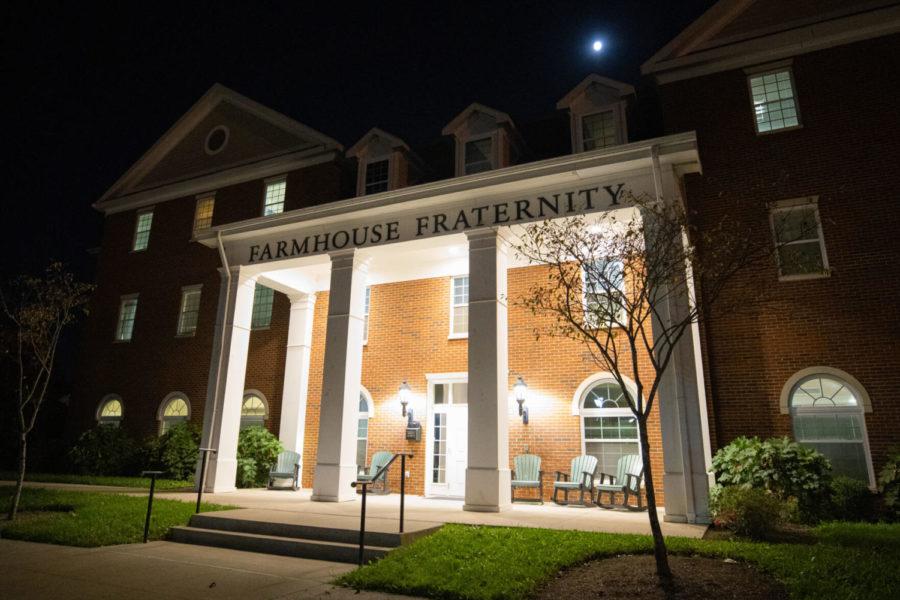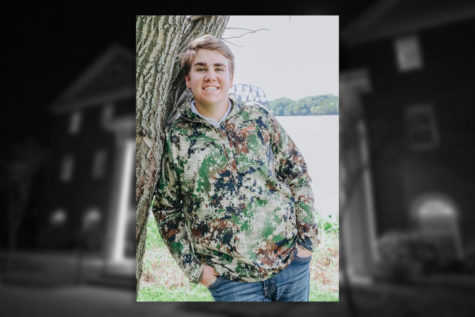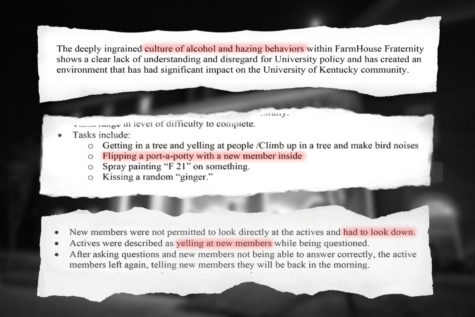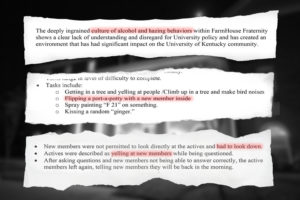Editorial: Hazing is life and death, not a game of semantics
The FarmHouse Fraternity house on Monday, Oct. 18, 2021, the night Hazelwood died, at the University of Kentucky in Lexington, Kentucky. Photo by Michael Clubb | Kentucky Kernel
The University of Kentucky has failed to paint the full picture of the death of Thomas “Lofton” Hazelwood.
Hazelwood, a new member of the FarmHouse Fraternity, gathered with his fellow members in the afternoon on Oct.18, 2021. Mere hours after his arrival, Hazelwood died due to alcohol toxicity, according to the Fayette County Corner’s toxicology report.
The University of Kentucky said because at least one new member present refrained from drinking during the activity at the chapter house, the events of Oct. 18 leading to Hazelwood’s death are not considered hazing.
By refusing to say FarmHouse Fraternity created an environment where destructive behavior felt like an obligation — leading to the death of a new member — the university is continuing to allow students to be exposed to unsafe practices.
UK has failed its students. It has failed to do its job. And it failed Hazelwood.
To bring real change to a campus where students are abused at the hands of their peers, administration must act loudly and with purpose to protect students like Hazelwood.
Hazelwood entered FarmHouse Fraternity as an 18-year-old, first semester freshman looking for a brotherhood. After about two hours of drinking in a house Hazelwood thought had responsible parties present, he lost his life.
Failure of the university to classify the actions of FarmHouse Fraternity on Oct. 18, 2021, as hazing gives remaining student organizations room to continue engaging in unsafe practices.
University of Kentucky Administrative Regulation 6:10 identifies hazing as any act performed for affiliation with a group that is negligent, reckless, humiliating, endangering or interferes with academic and employment opportunities.
At the time of Hazelwood’s death, FarmHouse Fraternity held the status of registered student organization. This status brings with it the expectation to follow UK’s Code of Student Conduct.
A student conduct investigation following Hazelwood’s death found the fraternity to be in violation of 10 out of 13 actions that may constitute hazing, as listed in the above regulation.
The same student conduct report ends by calling the expected participation of members in activities of FarmHouse Fraternity as creating an environment with “significant impact on the University of Kentucky community.”
However, UK continues to maintain Hazelwood did not die at the hands of hazing.
“Based on the information gathered through the investigation interviews, it does not appear that new members were coerced, forced, or required to consume alcohol on October 18, 2021, in the chapter facility,” the student conduct report said. “However, what is unclear is how an environment may have been created that made new members feel that they were expected to consume alcohol prior to chapter serenade events.”
The university has not classified Hazelwood’s death as hazing based on a technicality. Public perception of the university cannot be considered more important than the condemning of dangerous actions by university associated groups.
Information is power.
To keep the campus community safe, the university needs to be more forthcoming. The university needs to value student safety over its own image. The university needs to be better.
In an email after Hazelwood’s death, the university said upon the completion of investigations, they would make public “any findings and recommendations, subject to necessary redactions to protect the privacy of students.”
Over two months later, the university announced via email investigations had closed and further information would be made available later that day.
The university shared less than nine full pages of the completed 16-page Student Conduct Report obtained through an open records request by the Kentucky Kernel.
Redactions made to protect student privacy should be limited to names and personal details. In the publicly shared reports, the university failed to include full paragraphs detailing findings of the investigations.
Quietly sharing minimal information with the campus community is jeopardizing the safety of students.
The University of Kentucky is failing to tell its students what they need to know. It is failing to do its job. It failed Hazelwood.





























































































































































